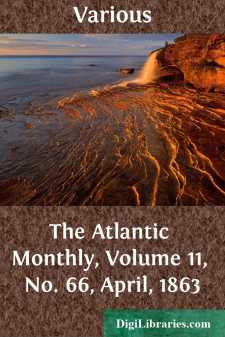Categories
- Antiques & Collectibles 13
- Architecture 36
- Art 48
- Bibles 22
- Biography & Autobiography 813
- Body, Mind & Spirit 142
- Business & Economics 28
- Children's Books 16
- Children's Fiction 13
- Computers 4
- Cooking 94
- Crafts & Hobbies 4
- Drama 346
- Education 46
- Family & Relationships 57
- Fiction 11829
- Games 19
- Gardening 17
- Health & Fitness 34
- History 1377
- House & Home 1
- Humor 147
- Juvenile Fiction 1873
- Juvenile Nonfiction 202
- Language Arts & Disciplines 88
- Law 16
- Literary Collections 686
- Literary Criticism 179
- Mathematics 13
- Medical 41
- Music 40
- Nature 179
- Non-Classifiable 1768
- Performing Arts 7
- Periodicals 1453
- Philosophy 64
- Photography 2
- Poetry 896
- Political Science 203
- Psychology 42
- Reference 154
- Religion 513
- Science 126
- Self-Help 84
- Social Science 81
- Sports & Recreation 34
- Study Aids 3
- Technology & Engineering 59
- Transportation 23
- Travel 463
- True Crime 29
The Atlantic Monthly, Volume 11, No. 66, April, 1863
by: Various
Categories:
Description:
Excerpt
ON THE VICISSITUDES OF KEATS'S FAME.
[Joseph Severn, the author of the following paper, scarcely needs introduction to the readers of the "Atlantic Monthly"; but no one will object to reperusing, in connection with his valuable contribution, this extract from the Preface to "Adonais," which Shelley wrote in 1821:—
"He [Keats] was accompanied to Rome and attended in his last illness by Mr. Severn, a young artist of the highest promise, who, I have been informed, 'almost risked his own life, and sacrificed every prospect, to unwearied attendance upon his dying friend.' Had I known these circumstances before the completion of my poem, I should have been tempted to add my full tribute of applause to the more solid recompense which the virtuous man finds in the recollection of his own motives. Mr. Severn can dispense with a reward from 'such stuff as dreams are made of.' His conduct is a noble augury of the success of his future career. May the unextinguished spirit of his illustrious friend animate the creations of his pencil, and plead against oblivion for his name!"
Mr. Severn is residing in Rome at the present time, from which city he transmits this paper.]
I well remember being struck with the clear and independent manner which Washington Allston, in the year 1818, expressed his opinion of John Keats's verse, when the young poet's writings first appeared, amid the ridicule of most English readers, Mr. Allston was at that time the only discriminating judge among the strangers to Keats who were residing abroad, and he took occasion to emphasize in my hearing his opinion of the early effusions of the young poet in words like these:—"They are crude materials of real poetry, and Keats is sure to become a great poet."
It is a singular pleasure to the few in personal friends of Keats in England (who may still have to defend him against the old and worn-out slanders) that in America he has always had a solid fame, independent of the old English prejudices.
Here in Rome, as I write, I look back through forty years of worldly changes to behold Keats's dear image again in memory. It seems as if he should be living with me now, inasmuch as I never could understand his strange and contradictory death, his falling away so suddenly from health and strength. He had that fine compactness of person which we regard as the promise of longevity, and no mind was ever more exultant in youthful feeling. I cannot summon a sufficient reason why in one short year he should have been thus cut off, "with all his imperfections on his head." Was it that he lived too soon,—that the world he sought was not ready for him?
For more than the year I am now dwelling on, he had fostered a tender and enduring love for a young girl nearly of his own age, and this love was reciprocal, not only in itself, but in all the worldly advantages arising from it of fortune on her part and fame on his. It was encouraged by the sole parent of the lady; and the fond mother was happy in seeing her daughter so betrothed, and pleased that her inheritance would fall to so worthy an object as Keats....












